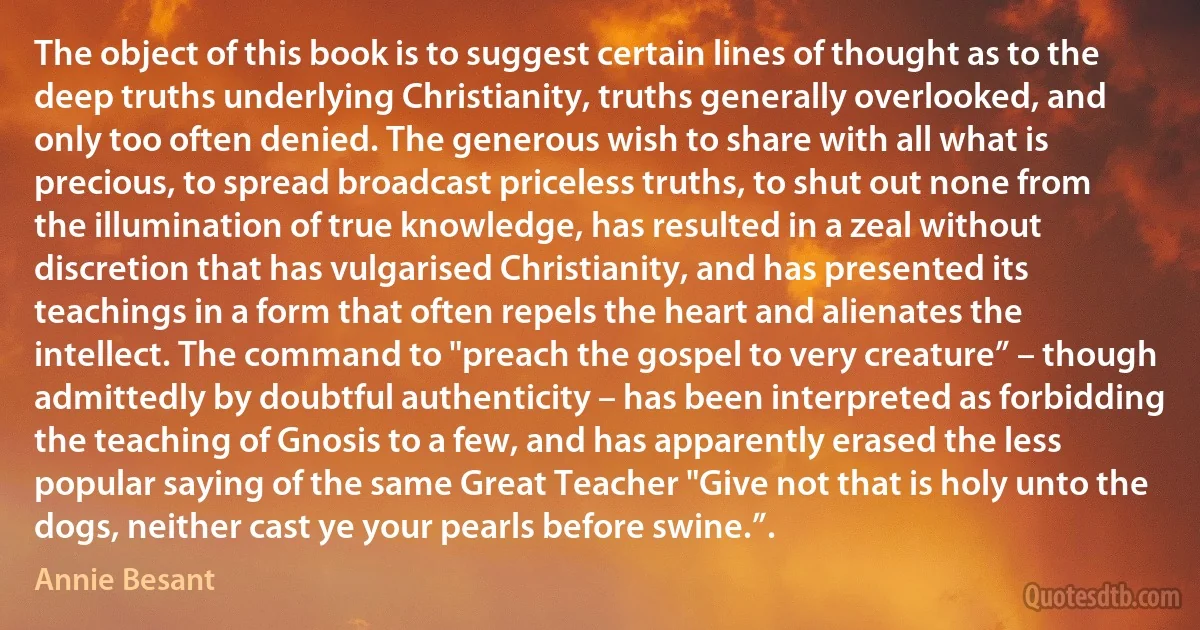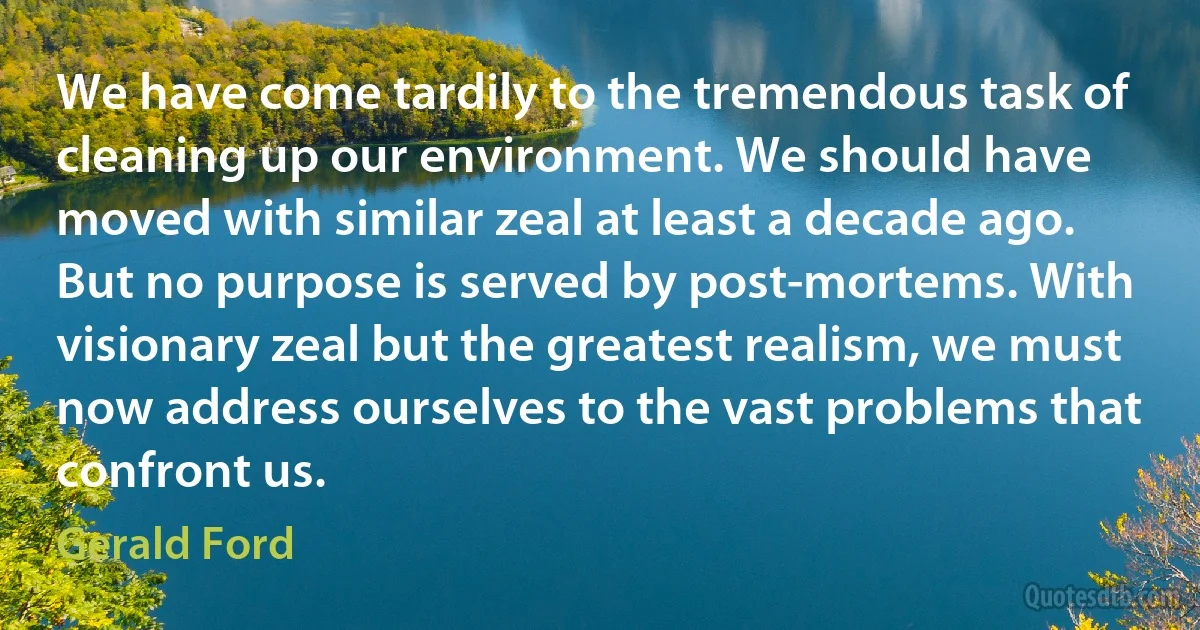Zeal Quotes - page 8
While I usually came back from meeting Gandhiji elated and inspired but always a bit sceptical, and from talks with Jawaharlal, fired with emotional zeal but often confused and unconvinced, meetings with Vallabhbhai were a joy from which I returned with renewed confidence in the future of our country. I have often thought that if fate had decreed that he, instead of Jawaharlal, would be the younger of the two, India would have followed a very different path and would be in better economic shape that it is today.

J. R. D. Tata
There is no crime that the Catholic Church did not commit,-no cruelty that it did not practice,-no form of treachery that it did not reward, and no virtue that it did not persecute. It was the greatest and most powerful enemy of human rights. It did all that organization, cunning, piety, self-denial, heroism, treachery, zeal and brute force could do to enslave the children of men. It was the enemy of intelligence, the assassin of liberty, and the destroyer of progress.

Robert G. Ingersoll
Give heed to the cause of the holy Roman Church, mother of all churches and teacher of the faith, whom you by the order of God, have consecrated by your blood. Against the Roman Church, you warned, lying teachers are rising, introducing ruinous sects, and drawing upon themselves speedy doom. Their tongues are fire, a restless evil, full of deadly poison. They have bitter zeal, contention in their hearts, and boast and lie against the truth.

Pope Leo X
There is nothing very extraordinary in this fact: no youth of the age I then was, can be expected to be more than one thing, and this was the thing I happened to be. Ambition and desire of distinction, I had in abundance; and zeal for what I thought the good of mankind was my strongest sentiment, mixing with and colouring all others. But my zeal was as yet little else, at that period of my life, than zeal for speculative opinions. It had not its root in genuine benevolence, or sympathy with mankind; though these qualities held their due place in my ethical standard. Nor was it connected with any high enthusiasm for ideal nobleness.

John Stuart Mill
He steered clear of the quicksands of useless scholarship, which had engulfed so many strong men of his time. The zeal of learned men in that period was largely given to knowing things not worth knowing, to discussing things not worth discussing, to proving things not worth proving.

Andrew Dickson White
We can and must deter terror; we can and must conduct surveillance; we can and must find terror cells and plotters; and we need to fight them aggressively in the battlefield abroad and prosecute them carefully under the law if they are citizens at home. But the zeal and arrogance of Bush and Cheney have done this at the expense of the heart and soul of Western jurisprudence and constitutional liberty. They must not get away with it. Our inheritance is too precious to squander in a fit of panic, sadism and hubris.

Andrew Sullivan
Hasn't there ... been a little too much zeal in our reproof of children and friends for yielding to the temptations we ourselves find it most difficult to resist? We punish where we can least afford to sympathize. Of all the horrors of the daily news, it seems hardest to imagine the kind of cruelty that is intensified by the pain of its victims, but whenever we feel sympathy would weaken us, we are a little closer to the torturer.

James Richardson
The process which we see is the process of an upset which forces the gradual learning of how to become unattached from everything which seemed divine and holy, the collapse of zeal for the Lord of hosts. At the same time it leads to an apprenticeship in listening to the still, small voice, and the reinvention of a new type of zeal.

James Alison
If Peter Mandelson has an historical parallel, it is Robespierre, the architect of the Terror. Without his zeal and cool passion for the right of the French people, the ancien regime would almost certainly have reasserted itself in some way. His defence of the ideals of the revolution was absolute and unmoving. It won him no friends, and eventually swallowed him. It would be a tragedy for Labour if it were to do the same to the architect of its own revolution.

Trevor Phillips
Everything great glitters, glitter begets ambition, and ambition can easily have caused the inspiration or what we thought to be inspiration. But reason can no longer restrain one who is lured by the fury of ambition. He tumbles where his vehement drive calls him; no longer does he choose his position, but rather chance and luster determine it.
Then we are not called to the position where we can most shine. It is not the one which, in the long succession of years during which we may hold it, will never make us weary, subdue our zeal, or dampen our inspiration. Soon we shall see our wishes unfulfilled and our ideas unsatisfied.

Karl Marx
Tipu imprisoned and forcibly converted more than a lakh Hindus and over 70,000 Christians in the Malabar region (they were forcibly circumcised and made to eat beef). Although these conversions were unethical and disgraceful, they served Tipu's purpose. Once all these people had been cut off from their original faith, they were left with no option but to accept the very faith to which their ravager belonged, and they began to educate their children in Islam. They were later enlisted in the army and received good positions. Most of them morphed into religious zealots, and enhanced the ranks of the Faithful in Tipu's kingdom. Tipu's zeal for conversion was not limited only to the Malabar region. He had spread it all the way up to Coimbatore.

Tipu Sultan
A zeal for different opinions concerning religion, concerning government, and many other points, as well of speculation as of practice; an attachment to different leaders ambitiously contending for pre-eminence and power; or to persons of other descriptions whose fortunes have been interesting to the human passions, have, in turn, divided mankind into parties, inflamed them with mutual animosity, and rendered them much more disposed to vex and oppress each other than to co-operate for their common good. So strong is this propensity of mankind to fall into mutual animosities, that where no substantial occasion presents itself, the most frivolous and fanciful distinctions have been sufficient to kindle their unfriendly passions and excite their most violent conflicts. But the most common and durable source of factions has been the various and unequal distribution of property. Those who hold, and those who are without property, have ever formed distinct interests in society.

James Madison
In his ecclesiastical administration Peckham applied himself with much zeal to the correction of abuses in the church. ...statutes were passed ...forbidding the holding of livings in plurality or in commendam. ...Much of Peckham's episcopate was taken up with systematic and searching visitations of various dioceses of his province, for the most part conducted by himself in person. ...His insistence on his visitatorial rights had involved him in 1280 in a dispute with the king, and two years later the suffragans of Canterbury presented him with twenty-one articles complaining of his procedure and of the conduct of his officials.

John Peckham
There can be no fanatics in the cause of genuine liberty. Fanaticism is excessive zeal. There may be, and have been fanatics in false religion – in the bloody religions of the heathen. There are fanatics in superstition. But there can be no fanatic, however warm their zeal, in the true religion, even although you sell your goods and bestow your money on the poor, and go on and follow your Master. There may, and every hour shows around me, fanatics in the cause of false liberty – that infamous liberty which justifies human bondage, that liberty whose ‘corner-stone is slavery.' But there can be no fanaticism however high the enthusiasm, in the cause of rational, universal liberty – the liberty of the Declaration of Independence.

Thaddeus Stevens



